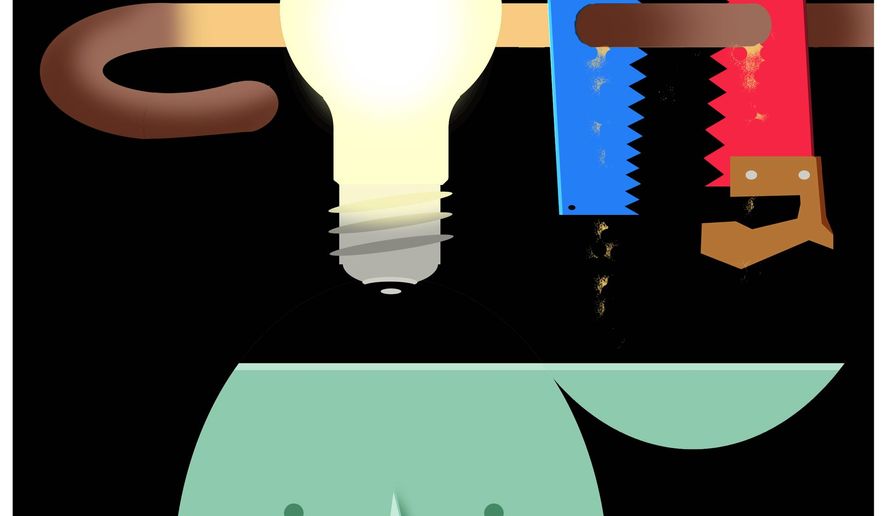OPINION:
As the Democratic takeover of the House and divided government becomes official, Washington, D.C. seems as polarized as ever.
And with Washington stuck in a budget stalemate, the American people are left wondering if bipartisan progress is possible.
Fortunately, even with Washington paralyzed, there is growing agreement on an issue that affects everyone — intellectual property (IP) and patent reform.
Policy makers from both parties recognize the American patent system is extremely valuable to our economy and under siege from serious international and domestic challenges. Foreign countries steal American intellectual property, while innovation-stifling U.S. court decisions weaken our system, causing patents to be wrongly invalidated.
The effects of theft and invalidated patents are the same: innovators lose claim to their inventions and are less incentivized to develop new ones. America’s technological edge over the rest of the world is at stake.
The 116th Congress has an opportunity to fix this.
Patents allow creators to use their innovations to drive advancements that promote economic growth. They are a national treasure.
As director of the U.S. Patent and Trademark Office Andrei Iancu explains, “With American patents, humans have made light. Have begun to fly for the first time. Have treated countless diseases. And have enabled communications around the globe instantaneously with tiny devices in our pockets.”
Think about your smartphone. How many innovations were needed to create these mini computers, faster than those of the Apollo missions, that fit in our pocket?
A strong patent system ensures that innovators can reap the rewards of their ideas, incentivizing them to work harder and dream bigger. As an inventor myself, I can attest to the drive patent protection brings.
Republicans and Democrats often disagree, but most believe the creativity enabled by free markets is an advantage economies like ours have over statist competitors like China. Defending our intellectual property against theft and modernizing our patent system for the 21st century must be top priorities for the United States to compete and win.
This pressing issue creates unlikely political alliances.
Take President Trump and Congressman Jerry Nadler. Mr. Nadler, a Democrat, will be the next chairman of the House Judiciary Committee, overseeing many of the investigations related to the administration and the 2016 campaign. Ideologically, he and Mr. Trump are enemies.
They may not know it, however, but on the issue of intellectual property and patent protection, Mr. Trump and Mr. Nadler appear to be more alike than expected. Mr. Trump prioritizes combating China’s intellectual property theft, and Mr. Nadler defends strong patent systems. Indeed, their views are virtually coextensive. Without a strong patent system, the United States cannot combat China’s intellectual property theft; and without combatting China’s intellectual property theft, we inherently weaken the U.S. patent system.
“The United States leads the world in innovation and creativity, which are key drivers of economic growth,” Mr. Nadler explains. “But creators cannot safeguard their inventions from infringement, exploit them for profit, or avoid unnecessary litigation, without a strong patent system to protect them.”
Mr. Nadler’s counterpart in the Senate will be Republican Sen. Lindsey Graham. Mr. Graham has a history of forging bipartisan compromises and is one of President Trump’s top allies. He too has spoken out in defense of America’s IP rights, calling out China for engaging in “unfair trade practices including forced transfer of technology and intellectual property.”
Bipartisanship works when both sides of the aisle claim a win, and IP reform achieves that goal. It is why in recent months we’ve seen bipartisan proposals emerge, such as the “Restoring America’s Leadership in Innovation Act of 2018” and the “STRONGER Patents Act” — bills that would strengthen patent rights to protect our innovators. Kentucky’s Libertarian-leaning Republican Rep. Thomas Massie introduced the first bill and was joined by Ohio Democratic Rep. Marcy Kaptur — two members usually not aligned on much.
The STRONGER Patents Act brings together conservatives such as Rep. Steve Stivers and Sen. Tom Cotton with some of Congress’ most liberal Democrats, including Sens. Chris Coons, Dick Durbin and Mazie Hirono, and Rep. Bill Foster.
The American people are clamoring for leaders from both sides of the aisle to find common ground, and with a foundation of trust already emerging, IP and patent reform represents perhaps the best chance for major bipartisan cooperation.
• Arvin Patel is the chief intellectual property officer at TiVo.




Please read our comment policy before commenting.